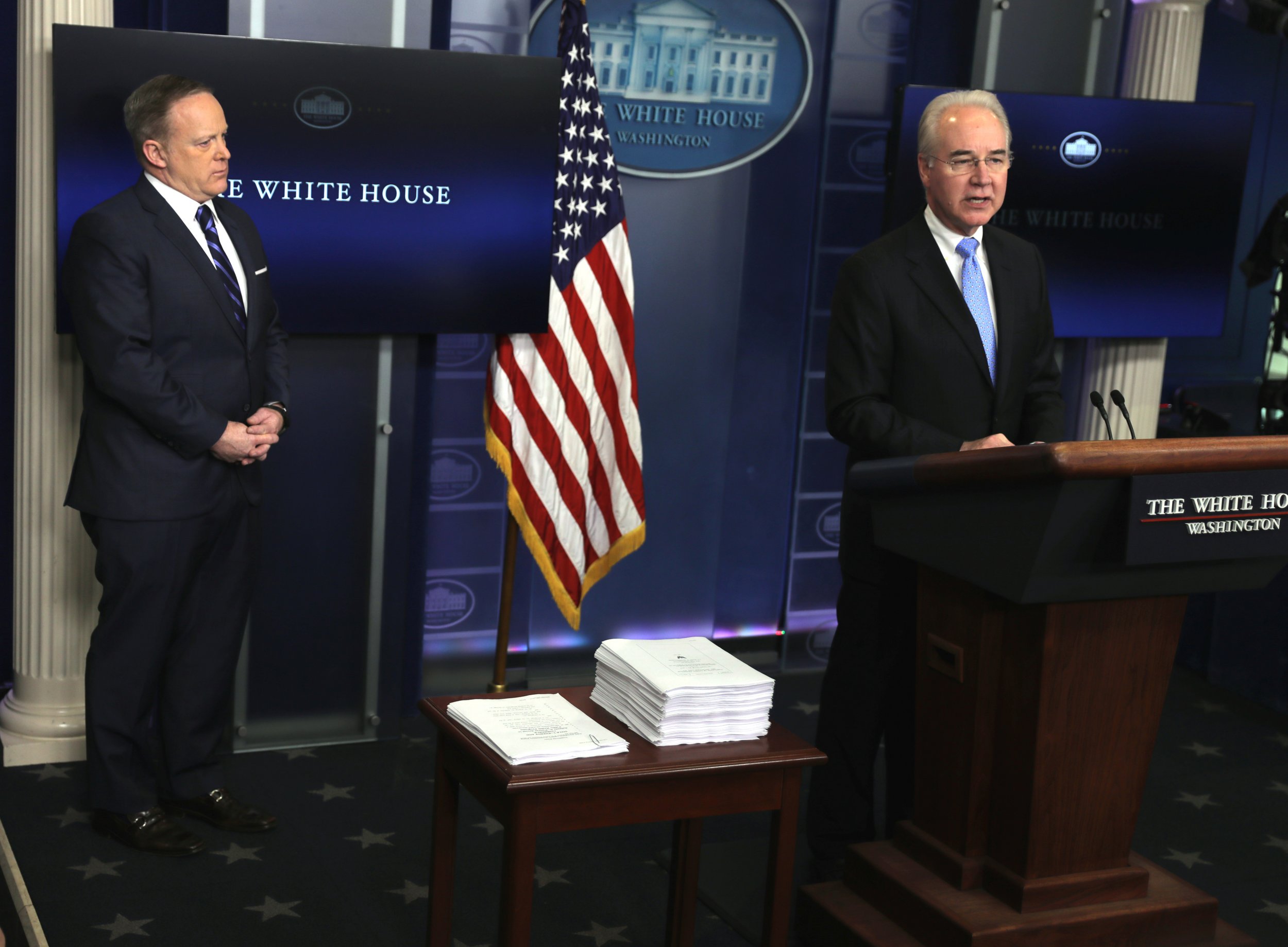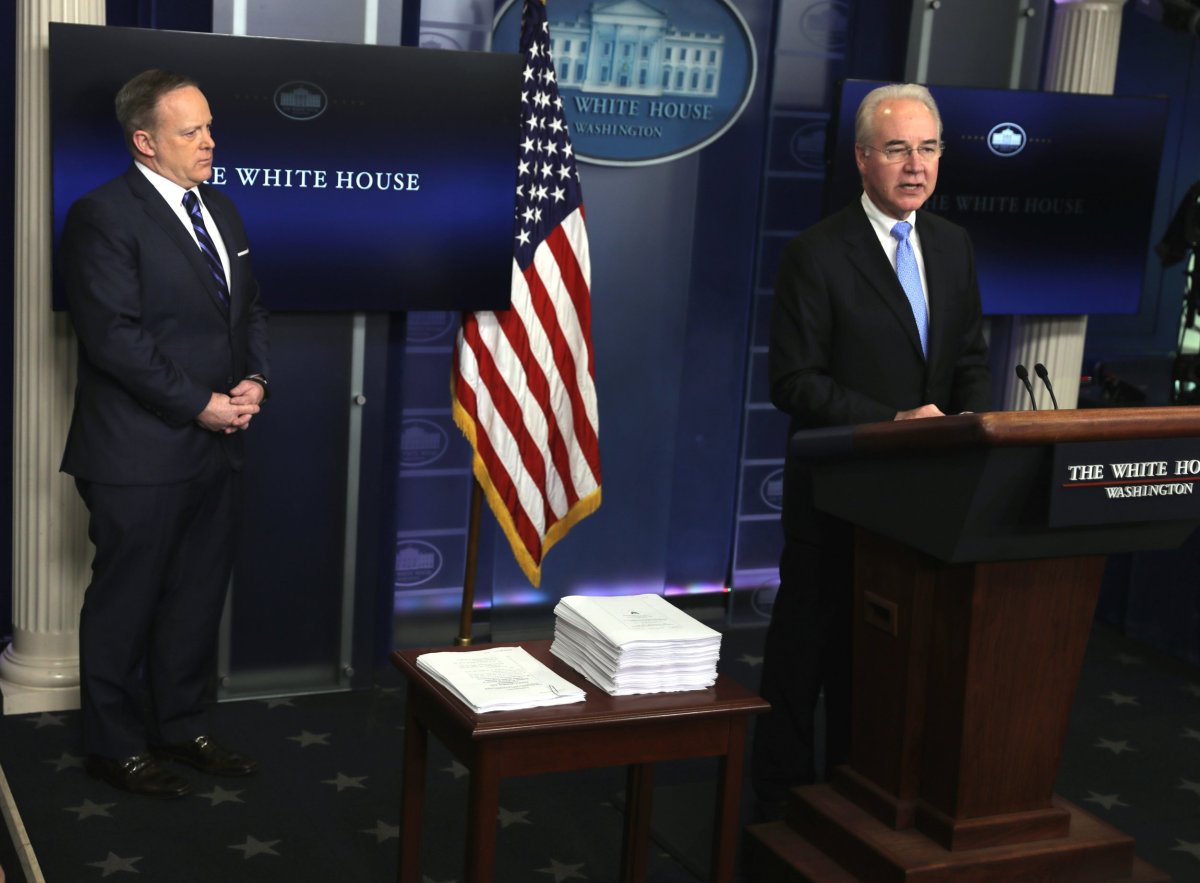
Welcome to Ryancare.
Today, House Republicans revealed their long-awaited health care bill. Intended as a replacement for the Affordable Care Act, the new legislation includes a shift away from income-based considerations, with potentially dire consequences for many Americans.
Gerard Anderson, professor of health policy and management at Johns Hopkins University School of Public Health, spoke with Newsweek about what provisions the new legislation includes—and what provisions it doesn't.
How does the proposed legislation affect someone who receives insurance through their employer?
To a large extent, not very much. The Affordable Care Act (ACA) didn't really change the benefit structure for most full-time employees. The new bill, American Health Care Act (AHCA), does not seem to make that much of a difference. There are some wellness benefits in the ACA, and it's unclear whether or not they will be retained in the revised version. But in general, people who receive insurance through their full-time employer won't be affected.
How does the new bill affect people who currently purchase insurance through the health care exchange set up by the ACA?
People with insurance obtained through the exchanges are going to be dramatically affected. The subsidy they receive is going to decrease, especially for low-income individuals. In my estimation, the low-income person is the one most severely impacted by this legislation. Right now, the subsidies are income-based. The more you earn, the less of a subsidy you receive. But the AHCA provides adjustments based upon how old you are, not what your income level is.
Health insurance is very expensive. Many people need large subsidies to pay the premium. If you're poor, you will not have the money to pay the premium, leaving you without insurance. If you are upper to middle class, you'll probably have the money to pay the premium, and you might do a little better under the AHCA than under the ACA because you'll receive a bigger subsidy.
That seems harsh.
Maybe, but that's the proposed law. Essentially, it takes money away from the poorest and gives it to the more affluent.
What's the rationale behind that shift?
I think the rationale is that everybody should receive the same benefit regardless of their financial ability to pay.

What is the difference between the subsidies provided for by the ACA and the tax credits provided for by the AHCA?
The tax credit in the ACHA replaces the subsidy, but it's also different. With a subsidy, you receive the money up front when you're buying insurance to help you pay for it. With a tax credit, you receive the money when you pay your tax bill a year, which could be a year or so later. You have to pay the money up front in order to buy insurance. Most Americans don't have the $5,000 to $10,000 to buy insurance and then wait for the tax credit a year later.
Does the tax credit put the purchaser into a lower tax bracket? If so, how does that affect people of different economic status?
Yes. If you have a high income, then you're in a higher tax bracket, so the benefit of a credit that moves you to a lower bracket is more significant than for someone already in a lower tax bracket.
People with lower incomes receive a double whammy with this new bill. The ACA subsidy was geared toward the low-income person. The AHCA is not. Plus, they have to lay out the money up front and wait for the credit later.
With the ACA, someone who chose to not purchase insurance would pay a penalty tax, the so-called "individual mandate." How does the AHCA compensate for people who would rather not purchase insurance?
The individual mandate is not part of the new bill. So, ostensibly, you would not have to buy health insurance if you didn't want to.
What are the consequences of choosing to not purchase insurance under the ACHA?
If you're healthy, you'll likely take the risk of not purchasing insurance. But if you don't have insurance and you have a heart attack, you're going to pay the full rack rates, the full charges, which no one else pays. You'll pay much more money for the same service as somebody who has insurance.
How does the absence of an individual mandate affect the overall approach to insurance?
For insurance to work, it requires having a mixed-risk pool. That is, some individuals must be low risk and some must be high risk. Insurance doesn't work if everybody enrolled in a plan is either healthy or sick. It has to be mixed.
If people who are sick enroll in insurance plans—which they will—and those who are healthy do not, then the insurer will have to raise the rates. Not requiring healthy people to buy insurance makes it very difficult for insurers to stay in business.
So a mixed-risk pool creates a kind of "herd immunity" to higher prices; everyone enrolling keeps prices lower.
Exactly.
Removing the individual mandate sounds bad for insurance companies.
I think insurers should be terrified of this law. The AHCA requires continued coverage of the sick but eliminates the requirements to cover the healthy as well. As an insurance company, you can forecast that an increasing number of sick people will join your health plan. That means premiums will increase, and if they can't, then the insurer loses money.
What is the continuous coverage provision in the AHCA, and how does it address this hurdle?
A landmark feature of the ACA was that would-be enrollees could not be denied coverage on the basis of having a pre-existing condition. The continuous coverage provision in the AHCA upholds that requirement, but with a caveat: Recipients must be continually enrolled in an insurance plan.
Someone who leaves work for a time due to an injury or an illness may not maintain benefits through their employer. If they choose to not purchase insurance on the free market, then they will pay a much higher rate when they do decide to re-enroll. That provision could incentivize people to remain enrolled with a plan, rather than risk being subject to higher rates later.
How does the new bill affect near-retirees and the newly retired?
Someone who is 64 and still employed is in the employment category won't really feel this change. But people who are no longer employed and not yet eligible for Medicare, therefore must purchase insurance through the private market, will see a difference. In this case, people who are affluent and older will do very well in these exchanges because the subsidy will be quite good. Those who are poor and elderly will do OK but not as well as they would have under the ACA because they lose the subsidy based on income level.
Are any changes to Medicare indicated in the new bill?
So far, the law is silent. President Donald Trump has said he won't touch Medicare. Paul Ryan, speaker of the House, said he will dramatically change it. Medicare is not part of this legislation at the moment. But the key words here are "at the moment"
What changes to Medicaid are proposed in the new bill?
Some states have allowed Medicaid coverage, and some have not. States that expanded Medicare can continue to do so until December 31, 2019.
So states without public insurance programs for the poorest will now not be allowed to start such programs?
I don't think we know the answer to this yet.
How are high earners affected by the new legislation?
Two provisions pertain specifically to high earners. Under the ACA, the affluent had to pay a higher Medicare tax. That was just a revenue generator. It was income redistribution. That tax is not part of the AHCA.
The other provision is what's known as the "Cadillac tax." Health insurance benefits are tax deductible, but some legislators question whether that deduction should have a limit. The Cadillac tax imposes a limit on that tax deduction. Employer-based health plans exceeding $10,000 in premiums per year for an individual or $27,500 for a family are subject to a 40 percent excise tax. Under the ACA, that requirement was set to begin in 2020. The AHCA would postpone that to 2025.
That postponement puts the effective date beyond the term limits of the current president, just as the effective date did under the ACA.
Exactly.
Who are the winners and losers with this new plan?
If you're affluent and healthy, you're a big winner. If you're less affluent and have a chronic disease, you lose out. People who are poor will, by and large, be worse off under this new scenario.
It seems that those who are poor and sick don't really have a voice in what new bill is enacted.
They don't have very much of a voice. Although, in recent town hall meetings, health care has been an important issue. People who are sick and didn't have insurance before the ACA and are now insured are becoming quite vocal.
What do you think has been a major problem with the ACA?
Because of how the exchanges were designed, insurance companies have dropped out. As a result, the competition is not as robust as was anticipated. That needed to change.
Is this why insurance companies on the exchange increased their rates by 25 percent at the start of this year?
That increase happened for two reasons. First, the lack of competition meant companies were free to raise prices. Second, the proportion of healthy people enrolling in the plans did not meet expectations, so the expenses were higher than anticipated.
The problem is that this new legislation will make this situation worse. Healthy people will be more likely to stay away from insurance with the newly proposed plan than they were before.
If insurance works best by having a mixed-risk pool, then is that an argument in favor of universal coverage?
That is essentially what the ACA was trying to accomplish by making health care affordable to the poor and mandating that everyone, including the healthy, have insurance.
When we take that mandate away, we will be left with sick people buying insurance and healthy people staying out of the market.
Then again, questioning the requirement to spend one's money on health insurance, especially if you're healthy, is understandable.
Nobody wants to be told to do something. But if only people with health issues enroll in health care plans, then the price becomes prohibitively expensive.
Uncommon Knowledge
Newsweek is committed to challenging conventional wisdom and finding connections in the search for common ground.
Newsweek is committed to challenging conventional wisdom and finding connections in the search for common ground.
About the writer
Jessica Wapner is the science editor for Newsweek. She works with a talented team of journalists who tackle the full spectrum ... Read more
To read how Newsweek uses AI as a newsroom tool, Click here.








